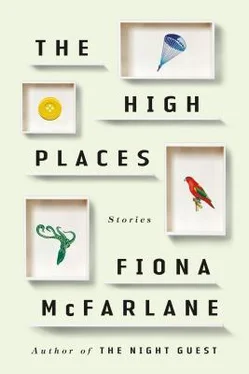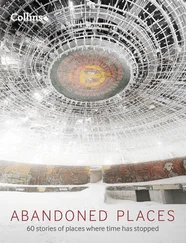Janet was worried she wouldn’t recognise Amy. But of course she recognised Amy, who cried out, ‘It can’t be!’ and advanced across the lobby with a look of delighted surprise on her face, as if their meeting were accidental. Amy wore slim white pants and a navy shirt with its jaunty collar turned up. She gathered Janet against her ribs. Eric’s great height still gave him an air of magnificent remoteness; the grey of his hair only amplified the effect. When he bent low to kiss Janet, she felt there was something exaggerated about the slow hinging of his body to reach the level of her cheek. She refused, at first, to stand on her toes to meet his approaching face, but capitulated in the end.
‘Welcome to Greece,’ said Eric. He said it with great seriousness, with a kind of weighty pride, as if he personally had prepared Greece, with effort but with no complaint, and with no particular thought for their pleasure; but he would share it with them anyway. Janet realised she was being uncharitable. She smiled apologetically at him. The Andersons had been in the country about five hours longer than they had.
‘Welcome!’ echoed Amy. ‘How was the flight? Such a long way!’
‘It’s just good to be here,’ said Janet. Amy was still holding her hand.
‘Isn’t it amazing to think: forty years, and here we are!’
Forty years ago, Murray had been completing his chemistry PhD and had, in a state of constant anxiety, crashed their small car three times. He and Janet were exhausted by England, by its complicated rules and the constant worry about where they would live next and how they would pay for it. Reflecting on that time, Janet saw herself eating toast and carrying shopping bags through rain almost continually, as if there had never been a summer (but there had been — three and a half of them, each glorious). They lived in a little college flat, and next door: Eric and Amy, not yet married, Eric a year ahead in his PhD and a philosopher, Amy on a Fulbright; they had painted their walls red without asking the college’s permission. Amy invited them in one afternoon, fed them tiny pickles and gin, and after this had befriended Janet in a confiding, collegiate way, lending her books, giving advice. They had little in common and were very intimate, and their men were forced to befriend each other.
Eric was famous for refusing to engage in small talk. At parties he used to sit in the most comfortable chair, holding a glass that was always refilled for him, quietly, unasked, as if he were actually asleep, when in fact he was reading; finally, later in the night, he would materialise in the centre of a group and begin to talk with an irresistible urgency about Kant or sex or Nixon or Freud. This used to fill Janet with fury. She complained to Murray that no one liked small talk, but only Eric Anderson felt he was above it. It’s sociopathic , she said, it’s intolerable . But Eric’s behaviour was not only tolerated, it was admired. Among their college acquaintances, Eric was always referred to, reverently, as a genius. No further explanation was offered or required. Alongside lively Amy, who danced and smoked, Eric seemed taintless and incorruptible; strange, then, that he should choose Amy, and apparently love her.
The Athenian Amy was a trim, ingenious woman, a walker in the early mornings, a subtle rearranger of hair, a gatherer of people, and a maker of plans. Observant. The first to admit her ignorance — ‘I know nothing whatso ever about Greece!’ — and the first to master it. Within hours of her arrival she could direct taxi drivers, expertly manage her currency, and give a number of personally observed examples of the civility of the Greeks, their candour and charm. She had been, in England, a large girl, well made, with blond limbs and hair. There was a ripe blaze upon her. Now she was thin in what Janet thought of as an American way: hard-won. Janet admired it. She admired the smooth shellac of Amy’s adult hair. During the week in Athens it made her, for some reason, ashamed of her persistent desire to browse among the cheap ceramics of the tourist shops in Plaka, to shop for plates and bracelets rather than take a dusty tour of the Agora. In Amy’s presence she became a shy glancer in mirrors — glances accompanied by brave smiles and the rubbing together of lips. She and Murray walked behind Amy and Eric through the Greek streets, and they smiled a great deal. They walked hand in hand until they noticed the Andersons didn’t. They never voiced strong opinions on where to eat or what to see, except that Janet wanted to go to Mycenae.
When Amy had contacted her with this Greek idea, Janet recalled a National Geographic article she’d once read about Mycenae, ancient home of kings. It had stayed with her for years: the death masks made of gold, the old name ‘Agamemnon’, the gate carved with two lions. When she looked up the magazine — Murray kept them all in yellow rows — it was just as she remembered it. There were the death masks with their precise eyebrows, there was the grey-green valley, and the ruins on the hill. She showed Murray, knowing it would interest him: he liked the layers of things, the way they fitted together. ‘Look,’ she said, ‘it was already a tourist destination in Roman times.’ She liked to think of the warriors buried in the old grave circles, sleeping for centuries with their gold faces, and of Agamemnon setting out for Troy. Janet checked the distances involved and found it was possible to make the trip from Athens in a day; she suggested this day trip to the Andersons.
‘I did hear it was just a hill with rocks on it,’ said Amy. Clearly she hadn’t factored Mycenae into her itinerary; she must be polite to Janet, but it would occupy a whole precious day. ‘I guess we could hire a car and driver. The hotel could organise it. I don’t like that phrase “day trip”, do you? It sounds so artificially lively. A minivan might be better. Then we’ll have room to stretch our legs.’ She looked pointedly at long-legged Eric, as if to emphasise the efforts she was making to preserve his dignity.
‘It was just an idea,’ said Janet, who knew she was being shrill and deferential. ‘We’re happy to go along with anything.’
But Murray cleared his throat and said, ‘You’ve wanted to see it, haven’t you, for some time?’
So Mycenae was decided upon as a special favour to Janet. Amy arranged it, just as she made the other plans. All week she led them through the streets of Athens with the enthusiastic gait of a tour operator; she was a sort of Hellenic shepherd. Eric co-operated with her silently until he noticed something that interested him. Then they stood and watched him be interested in it. He seemed oblivious to their waiting. When he was finished he stirred himself a little, a bear in spring, and they all moved forward again, the Dwyers wearing their accommodating smiles. Alone, Murray and Janet would have fussed about where to eat and when to withdraw money. They had done this in towns across Australia and England. Here in Greece they withdrew sums in the early mornings so as not to inconvenience the Andersons, and they allowed Amy to lead them into any café she liked the look of. There was one in Plaka she particularly favoured, a small place with tables on the street; she enjoyed watching the crowds of people as they took the sloping road up to the Acropolis, and observing their faces as they returned. The tourists made respectful space for these tables, looking at them longingly as they made their way up the hot hill, and they collapsed onto the café chairs in relieved exhaustion, crying out for cool drinks, as they descended. Amy never ordered cool drinks. She ordered coffee for herself and for Eric, but the Dwyers sipped at Cokes.
Читать дальше












